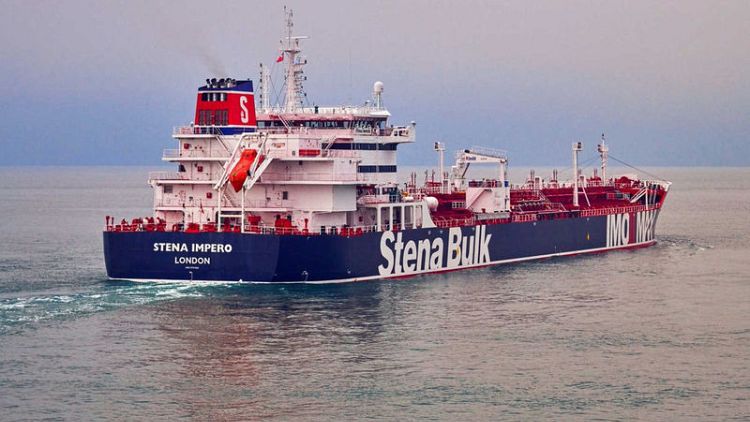By Parisa Hafezi and Steve Holland
DUBAI/WASHINGTON (Reuters) - Iran's Revolutionary Guards said they seized a British oil tanker in the Strait of Hormuz on Friday, while Tehran and Washington disagreed about a U.S. assertion that its Navy had downed an Iranian drone nearby, further increasing tensions in the Gulf region.
Britain said it was urgently seeking information about the Stena Impero tanker, which had been heading to a port in Saudi Arabia and suddenly changed course after passing through the strait at the mouth of the Gulf.
Iran's state news agency IRNA quoted a military source as saying the vessel had turned off its tracker, ignored warnings from the Revolutionary Guards and was sailing in the wrong direction in a shipping lane.
A second oil tanker, the British-operated, Liberian-flagged Mesdar, turned sharply north towards Iran's coast on Friday afternoon after passing westward through the Strait of Hormuz into the Gulf, according to Refinitiv tracking data.
British Foreign Secretary Jeremy Hunt said he was extremely concerned. "It is essential that freedom of navigation is maintained and that all ships can move safely and freely in the region," Hunt said ahead of a national security meeting on the issue.
Relations between Iran and the West have been increasingly strained in recent months over security in the Gulf, U.S. sanctions on Iran and Tehran's nuclear programme.
Military incidents in the Gulf have increased international concern that both sides could blunder into a war in the strategic waterway, which is vital to world oil supplies.
Oil prices gained on Friday, trading above $62 a barrel, after the latest spike in tensions along the waterway.
Iran shot down a U.S. drone in the Gulf in June and British naval forces seized an Iranian tanker in Gibraltar on July 4 on suspicion of smuggling oil to Syria.
Iran and the United States were at odds on Friday over a U.S. assertion that its Navy had shot down an Iranian drone on Thursday in the Strait of Hormuz because it had come too close to a U.S. warship.
'NO DOUBT'
U.S. President Donald Trump said there was no doubt the U.S. Navy warship Boxer had destroyed an Iranian drone but Tehran showed video footage that it said disproved the incident even happened.
“No doubt about it, no. We shot it down,” Trump said.
Speaking about Iran, he said the United States hopes "for their sake they don’t do anything foolish. If they do they will pay a price like nobody has ever paid a price.”
Trump announced on Thursday that the Boxer, an amphibious assault ship, had destroyed an Iranian drone because it had flown to within 1,000 yards (914 meters) of the ship in a "provocative and hostile action." A U.S. official said the drone was brought down by electronic jamming.
But Iran said all of its drones were accounted for.
"All drones belonging to Iran in the Persian Gulf and the Strait of Hormuz ... returned safely to their bases after their mission of identification and control," Abolfazl Shekarchi, a senior Iranian armed forces spokesman, was quoted by the semi-official Tasnim news agency as saying.
He said there was no report of any "operational response" by the Boxer and Iran's state television broadcast a video showing aerial views of ships that it said disproved the U.S. assertion.
The television station said the footage, which came from Iran's Revolutionary Guards, and the timing notations indicated the pilotless aircraft was still filming after Washington said it had been downed.
The episode is the latest test of nerves around the Strait of Hormuz, a major chokepoint for oil tankers.
Relations between Washington and Tehran worsened last year when Trump abandoned a 2015 nuclear deal between world powers and Iran. Under the pact, Iran agreed to restrict nuclear work, long seen by the West as a cover for developing atomic bombs, in return for lifting sanctions. But sanctions have been imposed again, badly hurting Iran's economy.
Trump said he would talk to Britain about the report of the British tanker being seized in the Gulf.
FALTERING DIPLOMACY
The United States has blamed Iran for a series of attacks since mid-May on shipping around the Strait of Hormuz. Tehran rejects the allegations.
The United States has reimposed economic sanctions to throttle Iran's oil trade and pressure Tehran to renegotiate the nuclear accord, discuss its ballistic missiles and modify its regional policies.
Tehran on Thursday signalled a willingness to engage in diplomacy with a modest offer on its nuclear work - ratification of a document prescribing more intrusive nuclear inspections if Washington abandoned its sanctions.
But a senior Trump administration official dismissed the offer by Iranian Foreign Minister Mohammad Javad Zarif.
Zarif appeared to have no decision-making ability and that Washington "would not consider anything from him serious," the official said.
Asked whom the United States would need to hear from in order to have negotiations over Tehran's nuclear programme, the official said: "I would say the supreme leader or the president."
Trump remained open to negotiations with Iran without preconditions on its nuclear programme and will maintain a tough economic sanctions regime on Tehran in the meantime, the official said.
U.S. Secretary of State Mike Pompeo said on Friday the United States needed Iran to "come to the table" for negotiations.
Pompeo, speaking at a counter-terrorism summit in Buenos Aires, also repeated an offer from Trump for talks without preconditions.
(Reporting by Steve Holland in Washington and Parisa Hafezi in Dubai; additional reporting by Reuters staff in Dubai and Reporting by Kate Holton and Jonathan Saul in London; writing by Alistair Bell; editing by Bill Trott and Grant McCool)
